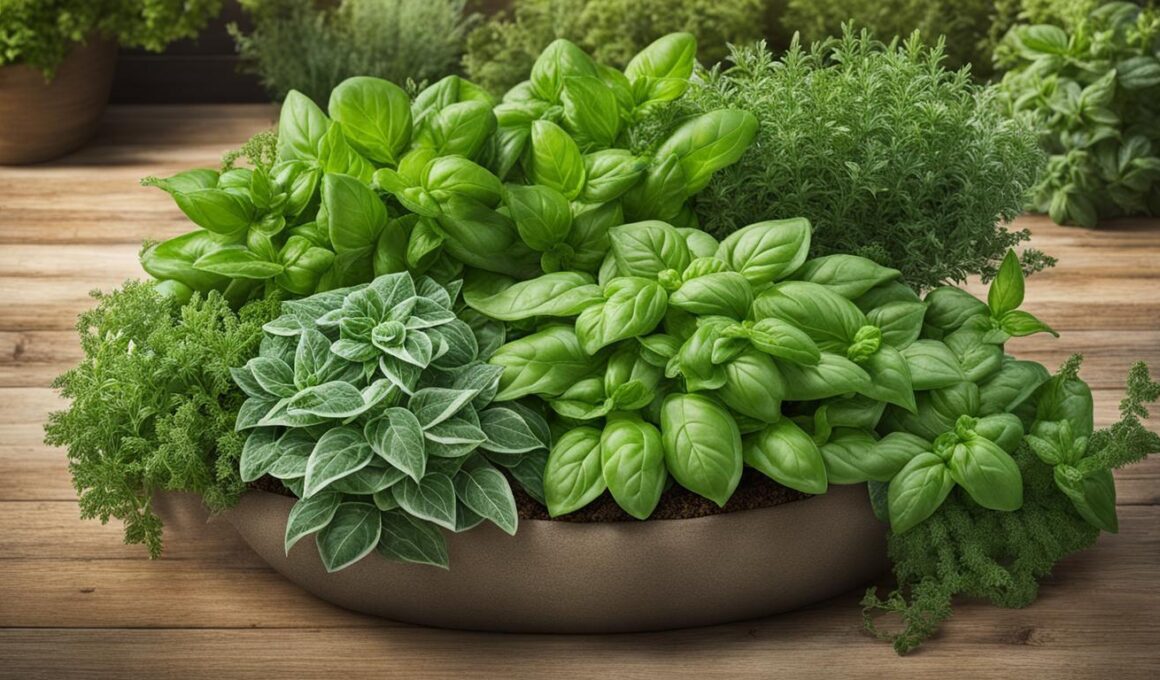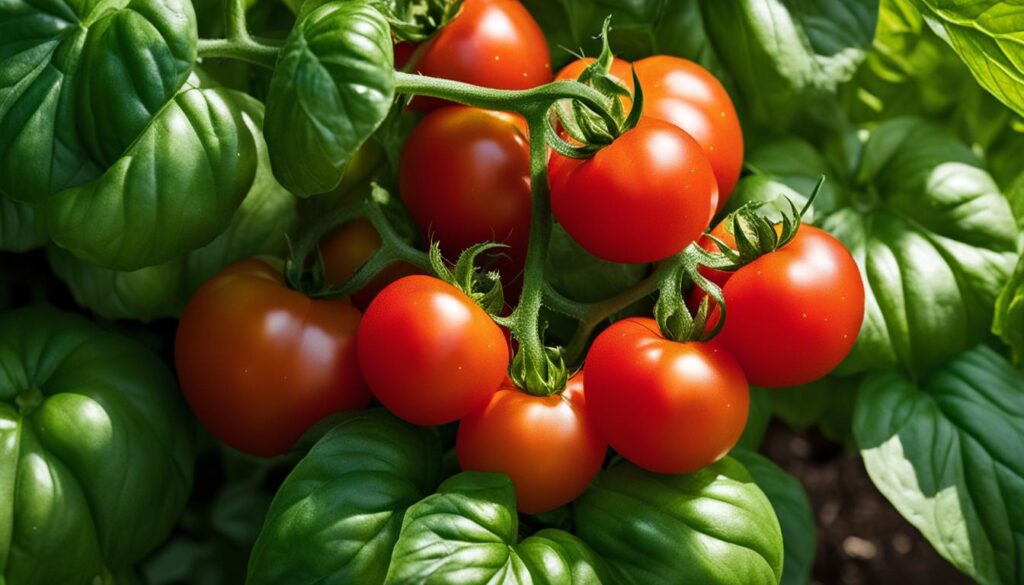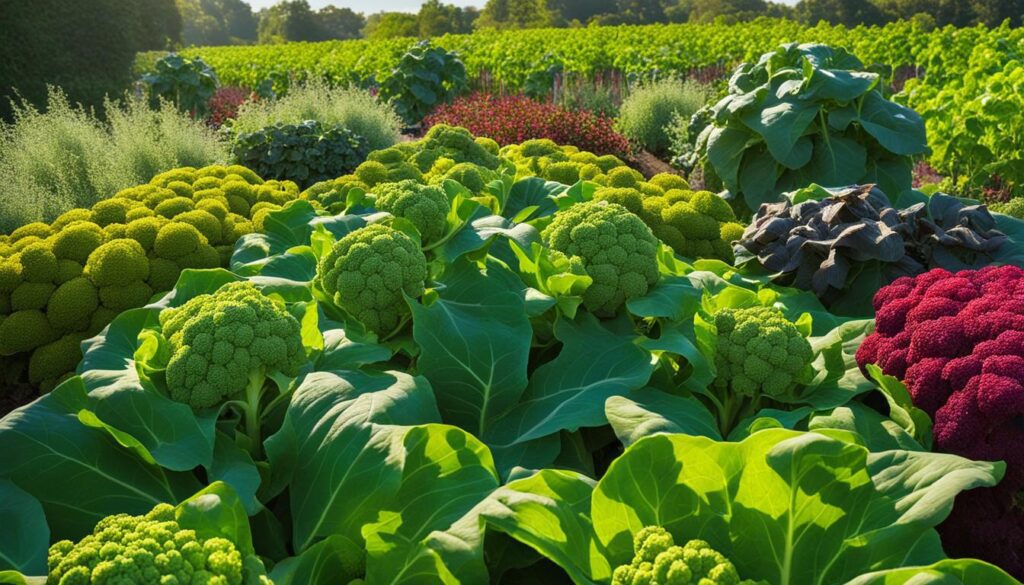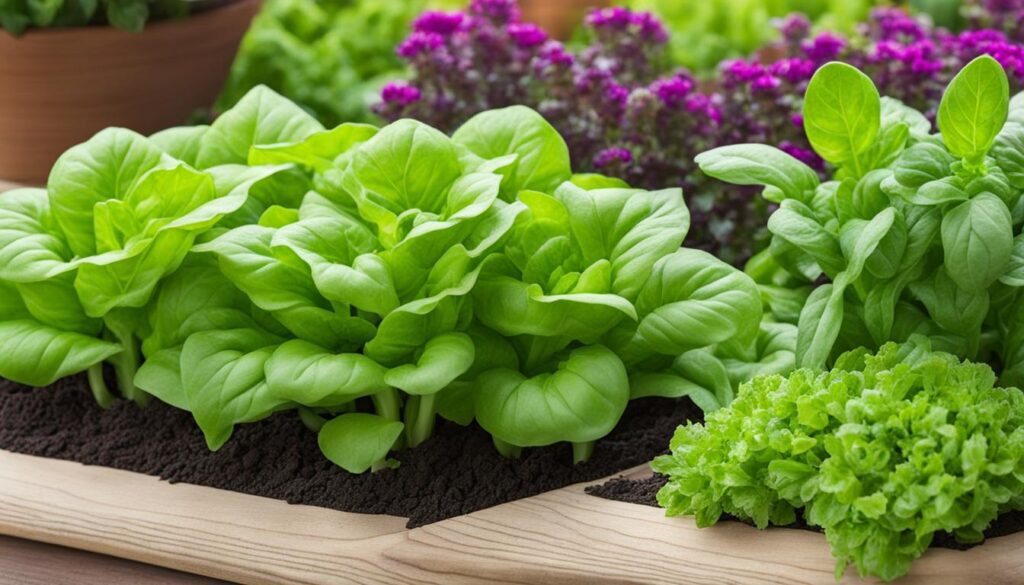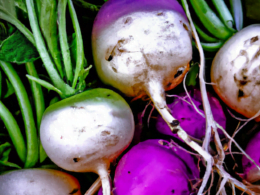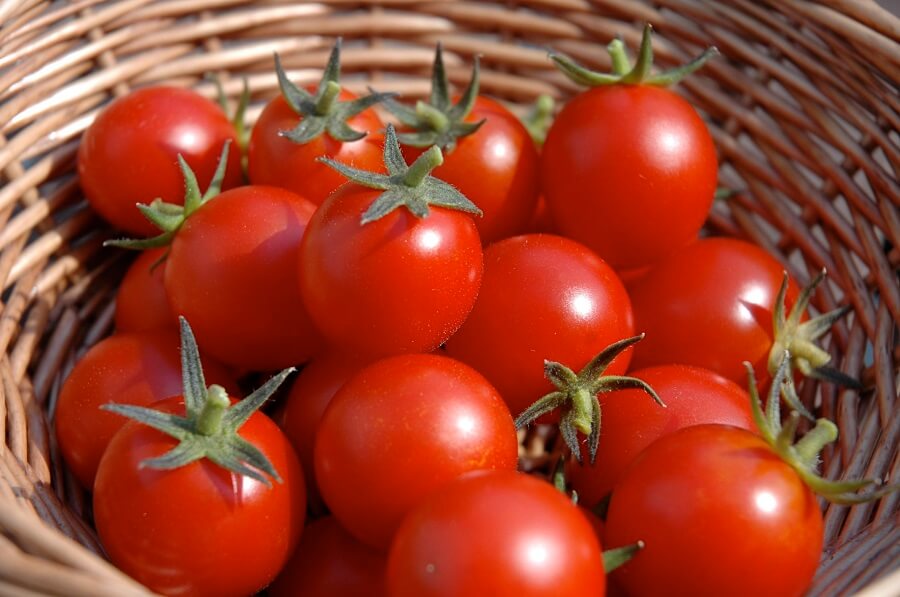Planting basil and sage together in your garden can have many benefits. Companion planting is an age-old technique that partners two or more plants together to provide specific benefits such as reducing pest pressure, improving yields, and enhancing disease suppression. Basil is known for its culinary uses and can also serve as a deterrent for certain pests, attract beneficial insects, and improve pollination rates. In this article, we will explore the best companion plants for basil, including tomatoes, eggplants, cole crops, lettuce, and root crops.
Key Takeaways:
- Basil and sage can be successfully planted together in the garden.
- Companion planting with basil can help reduce pest pressure and improve yields.
- Basil attracts beneficial insects and enhances pollination rates.
- Tomatoes, eggplants, cole crops, lettuce, and root crops are excellent companion plants for basil.
- By practicing co-planting herbs, you can maximize the potential of your herb garden.
The Benefits of Basil as a Companion Plant
Basil is not only a flavorful herb but also a great companion plant for many other vegetables and herbs. The primary advantages of using basil as a companion plant are improved pollination, improved biological control through beneficial insects, and improved pest control. When basil flowers, it attracts native bees and flies, which are important pollinators for fruit and vegetable crops. Basil flowers also provide nectar for beneficial predatory insects that help control common garden pests. While basil may not deter all pests, some studies have shown that it can be effective in deterring certain pests in the vegetable garden.
Tomatoes and basil are not only a great combination in the kitchen but also in the garden. Basil can help deter pests such as thrips, yellow-striped armyworms, and tomato and tobacco hornworms from tomato plants. The presence of basil next to tomatoes has been shown to reduce damage from these pests and improve the overall health and yield of tomato plants. Planting basil with tomatoes can also enhance the flavor of the tomatoes.
- Basil improves pollination rates
- Basil attracts beneficial insects
- Basil deters certain pests
- Basil enhances the flavor of tomatoes
“When basil flowers, it attracts an array of pollinators and beneficial insects to the garden, which in turn can improve the health and productivity of neighboring plants.”
The Benefits of Basil in the Garden
When considering companion planting in your garden, incorporating basil can provide numerous benefits. By interplanting basil with other vegetables and herbs, you can create a more balanced ecosystem that supports the growth and vitality of all plants involved. The strong aroma of basil can help mask the scent of other plants, making it harder for pests to locate their preferred host plants.
Additionally, basil’s attractive flowers can draw in a variety of beneficial insects that prey on common garden pests. These natural predators can help control pest populations, reducing the need for chemical pesticides. By relying on biological control methods, you can promote a healthier, more sustainable environment in your garden.
In summary, basil is a valuable companion plant due to its ability to attract pollinators, deter pests, and enhance the flavor of certain crops. By incorporating basil into your garden, you can enjoy the benefits of companion planting and create a thriving, harmonious ecosystem.
Tomato: The Essential Basil Companion Plant
When it comes to companion planting, tomatoes and basil are a match made in herb garden heaven. Basil not only adds a delicious flavor to your dishes but also provides numerous benefits when planted alongside tomatoes. One of the key advantages of this combination is pest control. Basil has been shown to deter pests such as thrips, yellow-striped armyworms, and tomato and tobacco hornworms from tomato plants.
By planting basil next to your tomatoes, you can help reduce damage from these common pests and improve the overall health and yield of your tomato plants. The aroma of basil acts as a natural repellent, deterring pests and protecting your precious tomatoes. Additionally, the presence of basil can enhance the flavor of tomatoes, making them even more delightful to eat.
To maximize the benefits of this companion planting duo, consider interplanting basil and tomatoes in your garden. This means planting them within close proximity to each other, allowing them to establish a mutually beneficial relationship. Not only will you enjoy the flavorful results in your kitchen, but your garden will also thrive with improved pest control and healthier plants.
Table: Basil Companion Plants
| Companion Plant | Main Benefits |
|---|---|
| Tomatoes | Improved pest control and flavor enhancement |
| Eggplants | Reduced damage from pests and improved plant health |
| Cole Crops (kale, cabbage, broccoli, etc.) | Deterrence of slugs and snails, enhanced pest resistance |
| Lettuce | Attracts beneficial insects for natural pest control |
“By planting basil alongside tomatoes, you can create an environment that is unfavorable for pests while enhancing the flavor of your tomatoes. It’s a win-win situation for both your garden and your taste buds!”
Basil Companion Plants: Eggplants
Basil is not only a great companion plant for tomatoes but also for eggplants. By interplanting basil and eggplants in your garden, you can enjoy a range of benefits, including improved pest control and overall plant health.
One of the key advantages of planting basil near eggplants is its ability to deter pests. The strong aroma of basil plants can act as a natural repellent for pests such as thrips and tomato and tobacco hornworms, which are common pests for both eggplants and tomatoes. By having basil nearby, you can help reduce damage from these pests and protect your eggplants.
In addition to pest control, basil can also enhance the overall health and yield of eggplant plants. The presence of basil has been shown to improve the flavor and vigor of eggplants, leading to more productive harvests. This combination of flavors can be particularly enjoyable in dishes that feature both basil and eggplants, such as eggplant parmesan or ratatouille.
| Eggplant Companion Plants | Pest Control Benefits |
|---|---|
| Basil | Deters thrips, tomato and tobacco hornworms |
| Marigolds | Repels nematodes |
| Nasturtiums | Attracts beneficial insects |
Overall, planting basil alongside eggplants can create a synergistic relationship that benefits both plants. The basil acts as a natural pest deterrent while enhancing the flavor and health of the eggplants. Consider incorporating this companion planting strategy in your garden to maximize the potential of your eggplant harvest.
Cole Crops: Surprising Basil Companion Plants
Basil is not only a great companion plant for tomatoes and eggplants but also for cole crops such as kale, cabbage, broccoli, cauliflower, and collards. By interplanting basil with cole crops, you can enhance the pest resistance and overall health of your cole crops.
Basil can help deter slugs and snails, which are common pests of cole crops. When basil is planted alongside cole crops, it acts as a sacrificial crop, attracting these pests away from the main crops and reducing the damage they cause. Additionally, basil attracts pollinators such as hoverflies and parasitic wasps, which are natural predators of aphids, another common pest of cole crops. By attracting these beneficial insects, basil can help control aphid populations and reduce pest damage in your cole crops.
The combination of basil and cole crops not only provides pest control benefits but also adds diversity to your garden. The aromatic foliage of basil contrasts beautifully with the leafy greens of cole crops, creating an aesthetically pleasing and visually engaging garden bed. So, consider planting basil alongside your kale, cabbage, broccoli, cauliflower, or collards to enjoy the benefits of co-planting herbs in your garden.
Table: Companion Plants for Cole Crops
| Cole Crop | Companion Plants |
|---|---|
| Kale | Basil, dill, garlic, onions, sage |
| Cabbage | Basil, dill, onions, rosemary, thyme |
| Broccoli | Basil, dill, garlic, onions, rosemary |
| Cauliflower | Basil, dill, onions, rosemary, thyme |
| Collards | Basil, dill, garlic, onions, sage |
Table: Companion Plants for Cole Crops. This table provides a list of companion plants that can be planted alongside cole crops to enhance their growth and pest resistance.
Basil and Lettuce: A Winning Combination in the Garden
When it comes to companion planting, basil and lettuce are a match made in heaven. By planting basil near your lettuce, you can create a beneficial environment that promotes healthy growth and natural pest control. The aromatic oils of basil act as a deterrent for common lettuce pests, such as aphids, while also attracting beneficial insects that prey on these pests.
The nectar-rich flowers of basil attract hoverflies and parasitic wasps, which are natural predators of aphids. These beneficial insects will help keep aphid populations in check, reducing the need for pesticides or other chemical interventions. Additionally, the close proximity of basil to lettuce can enhance biological control in the garden, creating a harmonious ecosystem where pests are naturally controlled.
Interplanting basil and lettuce also offers practical benefits. The two plants have similar growing requirements, making them compatible companions in terms of sunlight, water, and soil conditions. By growing them together, you can optimize space in your garden and maximize the productivity of your growing area.
Benefits of Planting Basil and Lettuce Together:
- Basil acts as a natural pest deterrent for lettuce, particularly against aphids.
- The presence of basil attracts beneficial insects that prey on lettuce pests.
- Basil enhances biological control in the garden, reducing the need for pesticides.
- Interplanting basil and lettuce optimizes space and maximizes productivity.
By harnessing the power of companion planting, you can create a thriving garden where basil and lettuce coexist harmoniously. Enjoy the benefits of improved pest control, increased pollination rates, and healthier plants. Whether you’re an experienced gardener or just starting out, incorporating basil and lettuce into your garden is a winning choice.
What are the benefits of planting basil and sage together?
Planting basil and sage together has many benefits. Both herbs are compatible companions, promoting healthy growth and deterring pests when planted in close proximity. Additionally, using basil oregano in cooking can enhance flavor and provide numerous health benefits, making it a valuable addition to any garden.
Conclusion
In conclusion, planting basil and sage together in your herb garden can be a beneficial choice. Basil, as a companion plant, has many advantages when co-planted with other herbs and vegetables. It can improve pollination rates, enhance biological pest control, and contribute to the overall health of your garden.
When considering co-planting herbs, it’s important to choose compatible plants with similar growing requirements and spacing recommendations. By practicing companion planting and interplanting basil with herbs like tomatoes, eggplants, cole crops, lettuce, and root crops, you can maximize the potential of your garden.
Remember to follow herb gardening tips and consider the specific needs of each herb. By implementing co-planting strategies, you can create a harmonious and productive herb garden that not only provides culinary delights but also supports the health of your plants and the ecosystem as a whole. Happy co-planting!
FAQ
Can I plant basil and sage together in my garden?
Yes, you can plant basil and sage together in your garden. They can be successful companion plants.
What are the benefits of basil as a companion plant?
Basil serves as a companion plant by improving pollination rates, enhancing biological control of pests, and improving overall garden health.
Can basil help control pests in tomatoes?
Yes, basil can help deter pests such as thrips, yellow-striped armyworms, and hornworms from tomato plants.
Can basil benefit eggplants in the garden?
Yes, basil can help reduce damage from thrips and hornworms, which are common pests for both eggplants and tomatoes.
Can basil be a companion plant for cole crops?
Yes, basil can benefit cole crops such as kale, cabbage, broccoli, cauliflower, and collards by deterring slugs and snails and attracting natural predators of imported cabbageworms.
Is basil a good companion plant for lettuce?
Yes, basil can attract beneficial insects that prey on common lettuce pests such as aphids, enhancing biological control in the garden.





